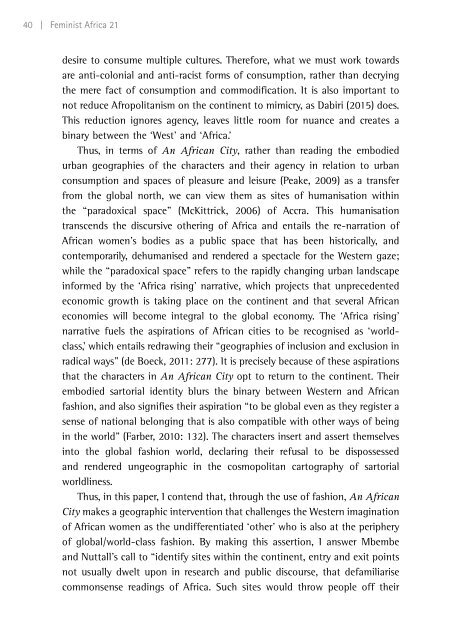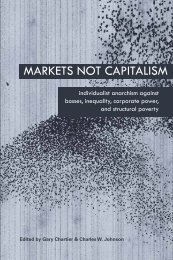The politics of fashion and beauty in Africa
fa21_proof_3
fa21_proof_3
You also want an ePaper? Increase the reach of your titles
YUMPU automatically turns print PDFs into web optimized ePapers that Google loves.
40 | Fem<strong>in</strong>ist <strong>Africa</strong> 21<br />
desire to consume multiple cultures. <strong>The</strong>refore, what we must work towards<br />
are anti-colonial <strong>and</strong> anti-racist forms <strong>of</strong> consumption, rather than decry<strong>in</strong>g<br />
the mere fact <strong>of</strong> consumption <strong>and</strong> commodification. It is also important to<br />
not reduce Afropolitanism on the cont<strong>in</strong>ent to mimicry, as Dabiri (2015) does.<br />
This reduction ignores agency, leaves little room for nuance <strong>and</strong> creates a<br />
b<strong>in</strong>ary between the ‘West’ <strong>and</strong> ‘<strong>Africa</strong>.’<br />
Thus, <strong>in</strong> terms <strong>of</strong> An <strong>Africa</strong>n City, rather than read<strong>in</strong>g the embodied<br />
urban geographies <strong>of</strong> the characters <strong>and</strong> their agency <strong>in</strong> relation to urban<br />
consumption <strong>and</strong> spaces <strong>of</strong> pleasure <strong>and</strong> leisure (Peake, 2009) as a transfer<br />
from the global north, we can view them as sites <strong>of</strong> humanisation with<strong>in</strong><br />
the “paradoxical space” (McKittrick, 2006) <strong>of</strong> Accra. This humanisation<br />
transcends the discursive other<strong>in</strong>g <strong>of</strong> <strong>Africa</strong> <strong>and</strong> entails the re-narration <strong>of</strong><br />
<strong>Africa</strong>n women’s bodies as a public space that has been historically, <strong>and</strong><br />
contemporarily, dehumanised <strong>and</strong> rendered a spectacle for the Western gaze;<br />
while the “paradoxical space” refers to the rapidly chang<strong>in</strong>g urban l<strong>and</strong>scape<br />
<strong>in</strong>formed by the ‘<strong>Africa</strong> ris<strong>in</strong>g’ narrative, which projects that unprecedented<br />
economic growth is tak<strong>in</strong>g place on the cont<strong>in</strong>ent <strong>and</strong> that several <strong>Africa</strong>n<br />
economies will become <strong>in</strong>tegral to the global economy. <strong>The</strong> ‘<strong>Africa</strong> ris<strong>in</strong>g’<br />
narrative fuels the aspirations <strong>of</strong> <strong>Africa</strong>n cities to be recognised as ‘worldclass,’<br />
which entails redraw<strong>in</strong>g their “geographies <strong>of</strong> <strong>in</strong>clusion <strong>and</strong> exclusion <strong>in</strong><br />
radical ways” (de Boeck, 2011: 277). It is precisely because <strong>of</strong> these aspirations<br />
that the characters <strong>in</strong> An <strong>Africa</strong>n City opt to return to the cont<strong>in</strong>ent. <strong>The</strong>ir<br />
embodied sartorial identity blurs the b<strong>in</strong>ary between Western <strong>and</strong> <strong>Africa</strong>n<br />
<strong>fashion</strong>, <strong>and</strong> also signifies their aspiration “to be global even as they register a<br />
sense <strong>of</strong> national belong<strong>in</strong>g that is also compatible with other ways <strong>of</strong> be<strong>in</strong>g<br />
<strong>in</strong> the world” (Farber, 2010: 132). <strong>The</strong> characters <strong>in</strong>sert <strong>and</strong> assert themselves<br />
<strong>in</strong>to the global <strong>fashion</strong> world, declar<strong>in</strong>g their refusal to be dispossessed<br />
<strong>and</strong> rendered ungeographic <strong>in</strong> the cosmopolitan cartography <strong>of</strong> sartorial<br />
worldl<strong>in</strong>ess.<br />
Thus, <strong>in</strong> this paper, I contend that, through the use <strong>of</strong> <strong>fashion</strong>, An <strong>Africa</strong>n<br />
City makes a geographic <strong>in</strong>tervention that challenges the Western imag<strong>in</strong>ation<br />
<strong>of</strong> <strong>Africa</strong>n women as the undifferentiated ‘other’ who is also at the periphery<br />
<strong>of</strong> global/world-class <strong>fashion</strong>. By mak<strong>in</strong>g this assertion, I answer Mbembe<br />
<strong>and</strong> Nuttall’s call to “identify sites with<strong>in</strong> the cont<strong>in</strong>ent, entry <strong>and</strong> exit po<strong>in</strong>ts<br />
not usually dwelt upon <strong>in</strong> research <strong>and</strong> public discourse, that defamiliarise<br />
commonsense read<strong>in</strong>gs <strong>of</strong> <strong>Africa</strong>. Such sites would throw people <strong>of</strong>f their



